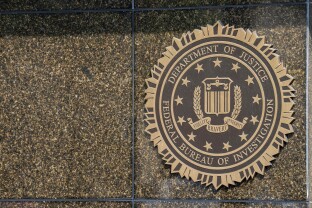Bitterness toward federal law enforcement emboldened by President Donald Trump since 2016 is holding up a vote to reauthorize a core tenet of the United States’ foreign surveillance law.
Congressional Republicans, facing an ever-nearing April deadline to renew Section 702 of the Foreign Intelligence Surveillance Act, still can’t agree on how to reform the law. Why? Republicans say it boils down to mounting distrust around the FBI, an institution that has been the subject of partisan outrage since the Trump presidency.
“Ninety percent of the problem here is, frankly, loss of trust in the FBI,” Sen. Marco Rubio, the top Republican on the Senate’s committee on intelligence, said of the stalemate over Section 702.
Congress failed to pass a longer-term FISA renewal last December when Speaker Mike Johnson was forced to pull two dueling bipartisan reform bills off the House floor amid high tensions within the Republican conference. Instead, the House temporarily extended Section 702’s authority through the spring.
The crux of the fight is over a demand to put warrant requirements for surveillance over any information that involves Americans. The Biden administration opposes the warrant requirement. A separate bill, originally approved by the House Intelligence Committee, moves reauthorization forward with some reforms, like requiring audits, and reducing the number of FBI personnel authorized to approve queries into Americans.
“We just think if you’re gonna go search the big haystack of information you should get a warrant, that’s the fundamental issue,” Rep. Jim Jordan, chairman of the Judiciary Committee, said when asked about that lack of trust in the FBI. “But in the end, if you’re gonna go search data of United States citizens, you should get a warrant.”
A growing number of House Republicans have become increasingly skeptical of the FBI in recent years — and an unusual coalition of liberal Democrats and conservative Republicans appear ready to join together to oppose the House Intelligence Committee’s bill.
The backdrop to the infighting on the Republican side of the aisle over Section 702 is Trump. On the campaign trail, the former president has taken direct aim at the FBI. He’s said that he’ll “clean out all of the corrupt actors in our national security and intelligence apparatus, and there are plenty of them” and baselessly claimed the agency has been “weaponized” to “target and persecute conservatives, Christians or the left’s political enemies.”
Several of his allies on the hill have echoed this outrage, with calls to defund the law enforcement agency. When it comes to the fight over FISA, there’s clear distrust that the FBI will not do what it says it will.
“I mean, like the FBI comes back and says, ‘Oh, don’t worry, we fixed it,’” Rep. Chip Roy, one of the conservatives advocating for a warrant, said. “We want to say, well, wait a minute, we want to have certain guarantees in there for citizens to protect themselves if the government overstepped its bounds.”
Democrats too, including Rep. Pramila Jayapal, the chair of the progressive caucus, and Rep. Zoe Lofgren have joined conservatives like Rep. Andy Biggs in calling for a warrant, out of concerns for American privacy. “The privacy of Americans should be of the utmost importance to our government,” Jayapal said in a statement.
According to a report published in November and referenced by Republican intelligence committee staff, information collected under Section 702 of FISA has “been abused by those who swore to support and defend the American people — in particular, the FBI.”
In addition, the secret surveillance court that oversees intelligence community spy programs found last year that the FBI had improperly searched the vast database of intelligence collection for the names of Americans believed to have stormed the Capitol on Jan. 6 and for people arrested in the racial-justice protests in the summer of 2020, prompting bipartisan condemnations. The Justice Department later acknowledged there was not a sufficient legal basis to conduct the search.
The House Intelligence Committee and House Judiciary Committee staff have come together to write legislation that will hopefully marry the dueling bills, but there’s still disagreement over requiring a warrant.
“Would a warrant requirement on the front end basically destroy the effectiveness of 702? I believe that’s the case and why I’m reluctant to go that direction,” Sen. Mark Warner, Democrats’ chair of the Senate intelligence committee, said. Conservatives like Rep. Dan Crenshaw agreed with saying a warrant isn’t a practical requirement.
“I think a lot of people don’t understand. They think, ‘Oh, well, that means you have access to that American’s email.’ No, you don’t. You just have access to that back-and-forth because you have access to the foreigner’s email, legally,” he said.
Roy said he’s open to provisions outside of warrants, pointing to a proposal to require regular reports to be submitted to committees in Congress on what queries are being conducted, which he proposed last year. He claimed it would let Congress know who is being queried by different members of the intelligence community.
“I mean, I want to get bad guys,” he said.
—
John T. Seward is a NOTUS reporter and an Allbritton Journalism Institute fellow.
Sign in
Log into your free account with your email. Don’t have one?
Check your email for a one-time code.
We sent a 4-digit code to . Enter the pin to confirm your account.
New code will be available in 1:00
Let’s try this again.
We encountered an error with the passcode sent to . Please reenter your email.


